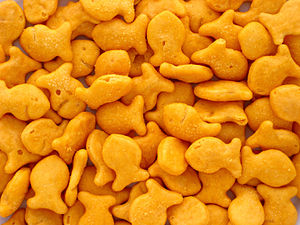John and I spent last weekend with friends in Newtown, Conn.
They have a school-aged child. As they described learning about the terrible events at Sandy Hook Elementary, and how the loss of 26 lives to a gunman continues to play out in their small town, I tried in vain to imagine what their experience must have been like.

Shortly after we got home, I read a blog post by Amy Spooner. Amy was inspired by NBC journalist Ann Curry’s 26 Acts movement to commit 26 random acts of kindness, one in honor of each of Newtown’s victims. Amy learned that one of the young victims offered to share a snack with a stranger on a plane, and was struck by the innocent generosity of that act.
Amy wrote about getting started with her 26 Acts project:
So I decided my acts of kindness would be to distribute 26 bags of goldfish crackers to strangers. To each I attached a note that read, “Six-year-old Allison once offered to share her goldfish crackers with a stranger on an airplane. Allison was killed at Sandy Hook Elementary School in December. To honor her, I am sharing my goldfish crackers with you. Love wins.”
It’s a sweet, simple idea. Then Amy runs into a complicated reality: we aren’t used to receiving random kindness from strangers, and that means at least some people will refuse the gift.
What do you do when you want to spread love in the world and the world doesn’t accept it? When you hold out your hand and get rejected?
Fast-forward to July 19 — my 40th birthday and an embarrassing four months after I bought the crackers. I finally handed out the last two bags (to the two cashiers working at gas station in my town) and sighed with relief. Those crackers had ridden around with me for way too long, and they were haunting me. Along the way, each hand-off became harder because I was more convinced that I was going to get the proverbial door slammed in my face, and because it was tiring to make an effort to reach out to people. I did face a lot of rejection — some pleasant (almost apologetic), and some just plain rude. I looked for easy outs, like the toll-booth attendants on the Indiana Toll Road on the Fourth of July. And I despised myself for turning this simple act into something so laborious.
Have we so internalized that idea “there’s no free lunch” that we reject kindness? Is it a ploy to get me to sign a petition, is it a marketing trick, is it poison?
When John and I went to Burning Man last year, I was moved by the generosity in the giant temporary desert community. Commerce is prohibited, gifting big and small is encouraged.

Telling people back home about this culture of giving led to a variety of interesting responses.
Some people interpreted “no commerce” as “barter.” You take things to trade. It didn’t make sense to them that you give something away without receiving something in return. Maybe it made even less sense to accept gifts from strangers with little more expected than a genuine “thank you.”
Others were suspicious. When we accepted homemade fudge from a stranger, how did we know it wasn’t laced with something? It’s so rare to accept a random act of kindness that their instinct was to consider a sinister motive. If someone offers you food, it must be to drug you.
John designed “thank you” postcards, which we had printed to give away at Burning Man. Our gift was encouraging random acts of kindness.
We were a little shy about getting started.
John set up a table with pens and stamps while I started asking people if they would like to write a thank you note to someone. A few people said no, a couple of them kind of sharply, and I felt that anxiety Amy describes. I was taking a social risk, approaching strangers to offer them something, and rejection gave me pause.
But others accepted. Some scratched out a quick note, others settled in to craft a thoughtful message, one woman cried and hugged me.
That’s what I mostly remember when I think of our gift: the people who opened themselves up to accept.
I think that’s the takeaway from my social experiment and Amy’s. That if we dwell on the negative, it will prevent us from making the world a better place.
And how can we overcome tragedies like Newtown, and prevent new ones, if we don’t make the effort to make things better?
[youtube=http://www.youtube.com/watch?v=BWBryeMJ9Fc]
- Today’s Gem of Gratitude #41 (lovebythedrop.com)
- People, companies spur random acts of kindness (foxnews.com)
- Road trip to provide acts of kindness (wptv.com)
- Simple Random Acts of Kindness Spread Joy (digelog.typepad.com)
- #27 Perform a Random Act of Kindness (fortybyfortybyforty.wordpress.com)


3 Comments
Amanda
This is a beautiful post, Colleen, and I agree — the best response to this tragedy and most tragedies is to love more.
Leave a reply